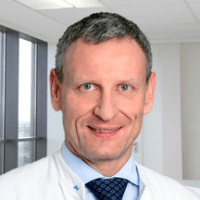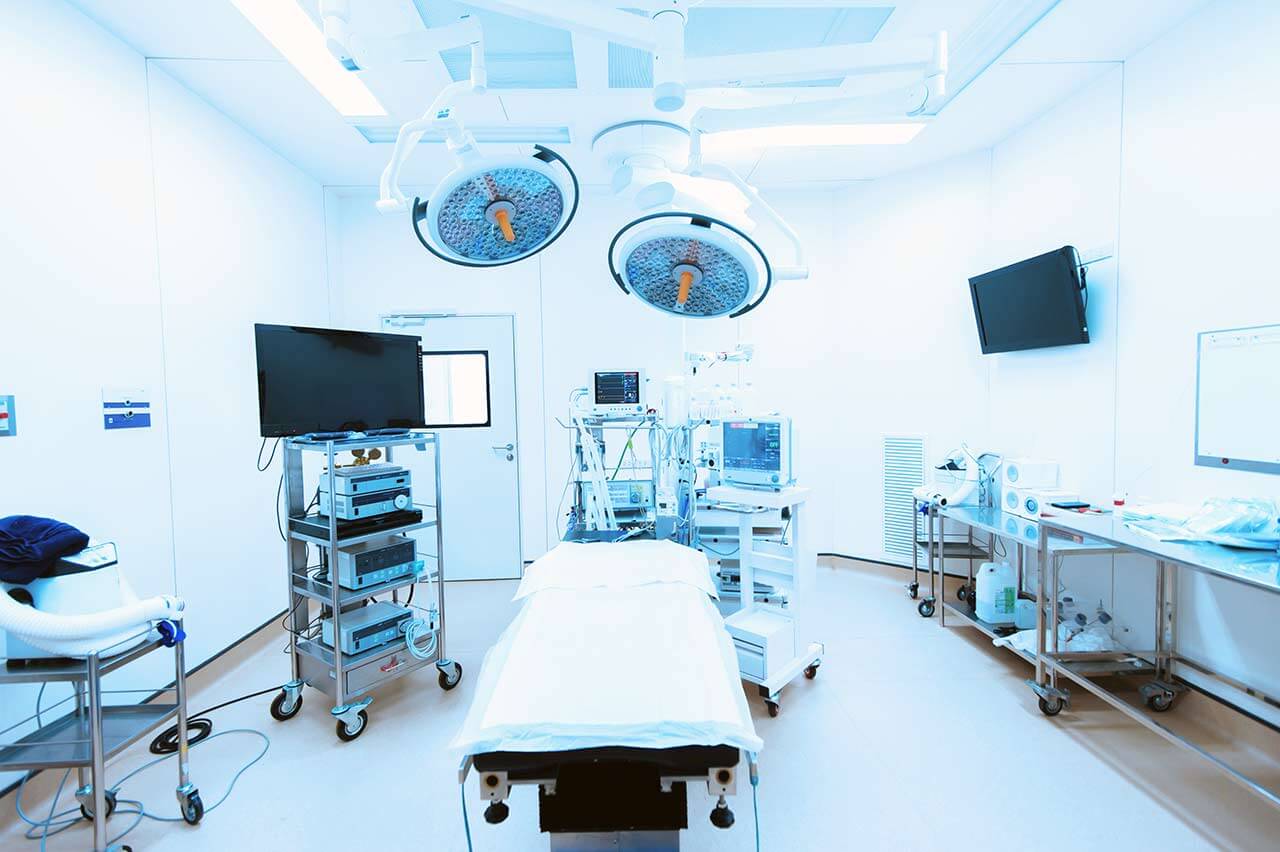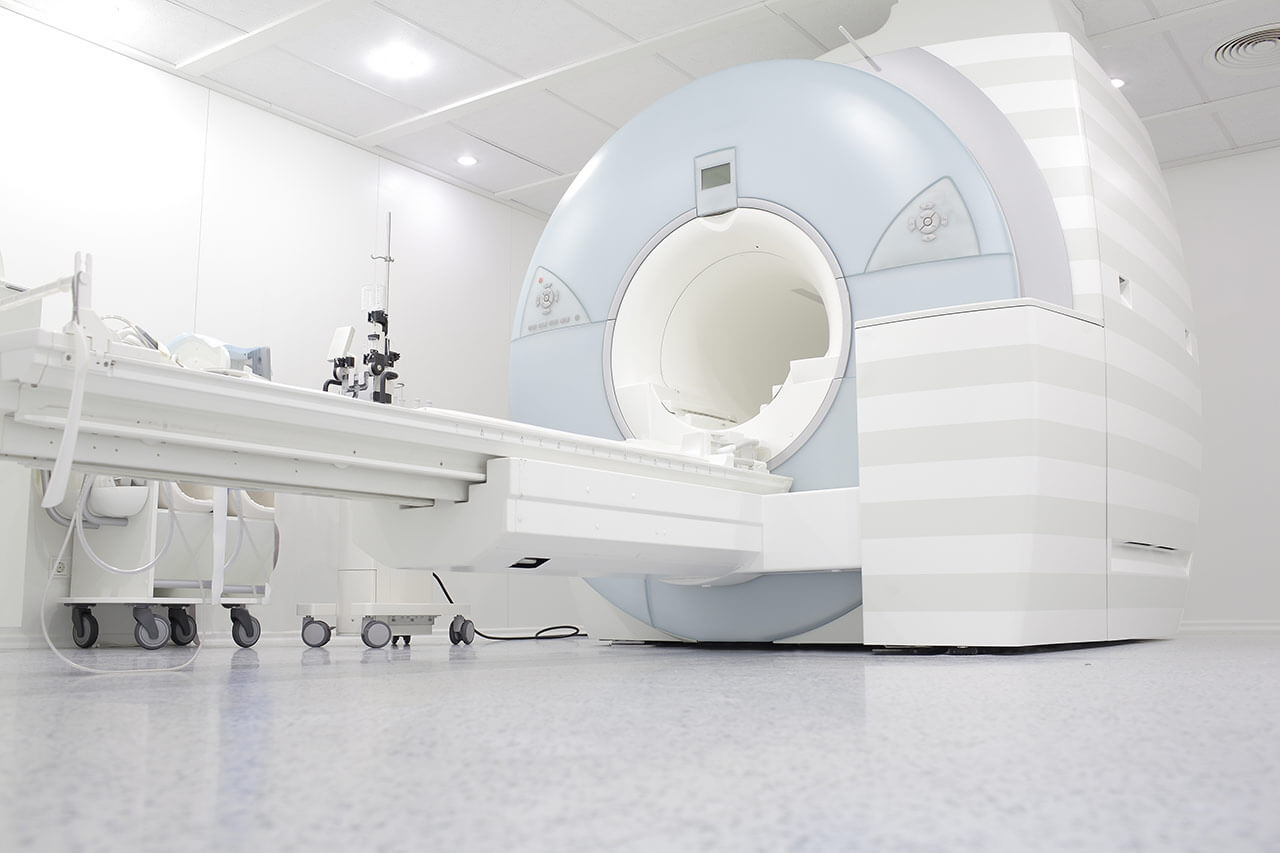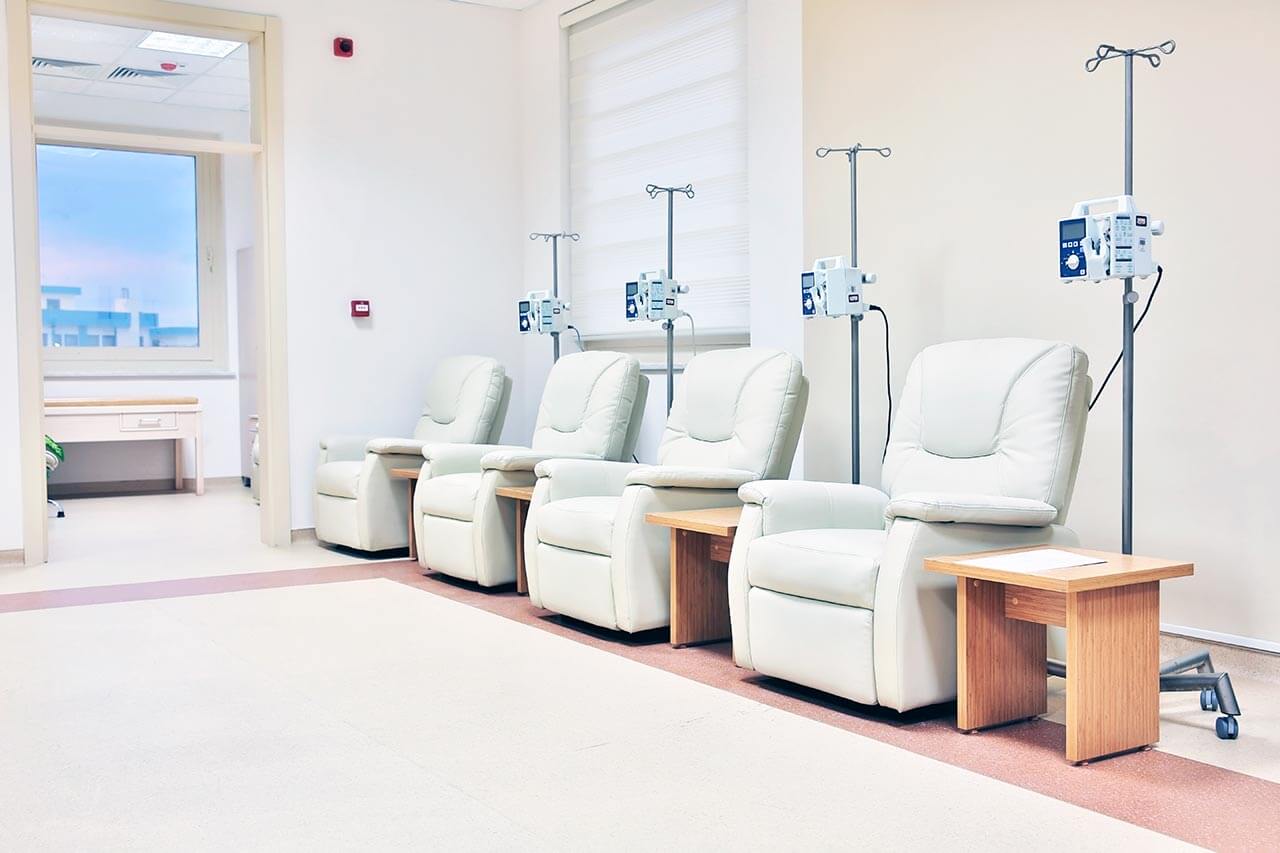
The program includes:
- Initial presentation in the clinic
- clinical history taking
- general clinical examination
- laboratory tests:
- complete blood count
- general urine analysis
- biochemical analysis of blood
- TSH-basal, fT3, fT4
- tumor markers
- inflammation indicators
- indicators of blood coagulation
- hormone blood tests
- abdominal CT/ MRI scan
- ultrasound scan
- course of radiotherapy
- nursing staff services
- elaboration of individual treatment plan
How program is carried out
During the first visit, the doctor will conduct a clinical examination and go through the results of previous laboratory tests and instrumental examinations. After that, you will undergo an additional examination, including complete blood count, laboratory assessment of liver and kidney function. Based on the received results, the physician will conduct radiotherapy planning with the help of CT or MRI, make the permanent tattoo marks on the skin and conduct CT simulation in order to assess the accuracy of the rays and the radiation dose. If necessary, related medical specialists will be involved in the elaboration of a treatment regimen (tumor board).
Radiation therapy is carried out as the day hospital procedure, without mandatory admission to the hospital. At each visit, the physician will assess your general condition and the marks on the skin. After that, you will be placed in a shielded radiation therapy room, on a special table.
Each radiation therapy session lasts less than half an hour (including preparation). All this time, doctors and nurses are monitoring your condition, you can communicate with them through a loudspeaker. The procedure is completely painless. Depending on the planned course of treatment, you will visit the hospital from 1 to 3-5 times a week.
After the completion of the radiation therapy course, you will undergo control examinations aimed at assessing your condition and efficacy of treatment. After that you will receive the medical report with detailed recommendations regarding further follow-up and treatment. In the future, you will be able to have a distant consultation with your attending physician and schedule the next course of treatment, if necessary.
Required documents
- Medical records
- MRI/CT scan (not older than 3 months)
- Biopsy results (if available)
Service
You may also book:
 BookingHealth Price from:
BookingHealth Price from:
About the department
The Department of Radiation Oncology at the Hospital Nordwest in Frankfurt am Main provides diagnosis, counseling and treatment for adults with cancer of all organs on an outpatient and/or inpatient basis. The Department annually treats about 1,400 new cancer patients. The head of the Department is Priv.-Doc. Dr. med. Michael van Kampen.
The cancer treatment by radiotherapy is especially successful. Some benign diseases can also be treated by radiation therapy. The drugs, which can decrease or increase exposure depending on the progressing of the disease, are used as auxiliary aids. Therefore, the Hospital Nordwest develops an individual treatment strategy that corresponds to the clinical situation of each patient. The medical team of the Department of Radiation Oncology under the direction of Priv.-Doc. Dr. med. Michael van Kampen provides its services on an outpatient and inpatient basis. There are treated all malignant oncological diseases in adults. The most common include cancer of the breast, lungs, rectum, prostate, metastases and rare tumors of soft tissues. Moreover, the Department of Radiation Oncology at the Hospital Nordwest specializes in radiotherapy for benign diseases. The most common indications in this field include radiation therapy for a heel spur and the treatment of degenerative joint diseases.
The Department of Radiation Oncology under the direction of Priv.-Doc. Dr. med. Michael van Kampen is the recognized Bowel and Prostate Cancer Center, certified by the German Cancer Society (Onkozert).
The main treatment focuses of the Department of Radiation Oncology at the Hospital Nordwest under the direction of Priv.-Doc. Dr. med. Michael van Kampen are:
Benign diseases:
- Irradiation of benign arthritis, such as arthrosis of large and small joints, heel spurs and achillodynia
- Irritative X-ray radiation (orthovoltage radiotherapy)
Malignant tumors:
In addition to the overall range of radiotherapy, there are used the following special techniques:
- IORT (intraoperative radiation therapy)
- Afterloading in the treatment of gynecological tumors, especially combined therapy for cervical cancer (intracavitary/ interstitial cancer) in combination with chemotherapy
- High-precision radiotherapy (stereotaxy/ radiosurgery) of benign and malignant tumors in the head
- IMLT (intensive modulated radiotherapy)
- Combined radio-chemotherapy
According to the Focus magazine rating of 2017, the Department of Radiation Oncology at the Hospital Nordwest ranks among the top German departments specializing in radiation therapy!
Curriculum vitae
Higher Education and Professional Career
- Since 2000 Chief Physician of the Department of Radiation Oncology at the Hospital Nordwest Frankfurt am Main.
- 2004 - 2006 Medical Director of the Hospital Nordwest Frankfurt am Main.
- 2005 Elected Chairman of the Specialized Committee of the TÜV Süd (Medical Position).
- 1995 - 2000 Habilitation in Radiology, Heidelberg University. Subject: "Is there a relation between the radiation dose and the effect of intraoperative radiation therapy?"
- 1994 - 1995 Assistant Physician at the German Cancer Research Center Heidelberg, FS05, Department of Radiation Oncology.
- 1993 - 1994 Assistant Physician, Department of Radiology (focus on radiation therapy), University Hospital Heidelberg.
- 1989 - 1993 Assistant Physician, Department of Radiation Therapy and Diagnostic Radiology, Hospital Nuremberg Nord.
- 1990 Doctoral thesis defense in Medicine, magna cum laude. Subject: "Determination of thymosin β4 in human blood cells and serum".
- 1982 - 1989 Study of Human Medicine at the Universities of Hamburg and Erlangen.
Clinical Interests
- High-precision radiation therapy.
- Intensity modulated radiation therapy.
- Stereotactic surgery.
- Radiosurgery.
- Combined chemoradiation therapy.
- Intraoperative radiation therapy.
Memberships in Professional Societies
- German Society for Radiation Oncology (DEGRO).
- American Society for Radiation Oncology (ASTRO).
- European Society for Therapeutic Radiology and Oncology (ESTRO).
- American Society of Clinical Oncology (ASCO).
- German Professional Association of Radiation Therapists (BVDST).
- Professional Association of Radiation Therapists of the State of Hesse (Board Member).
Photo of the doctor: (c) Krankenhaus Nordwest
About hospital
According to the reputable Focus magazine, the Hospital Nordwest Frankfurt am Main ranks among the top German medical facilities!
The hospital has a reputation of a modern multidisciplinary medical center with excellent quality of services. The medical complex is an academic hospital of the Goethe University Frankfurt, thanks to which it provides patients with treatment based on the very latest achievements of university medicine. The hospital has 12 specialized departments, as well as numerous narrowly focussed centers and institutes, whose doctors work hand in hand for the benefit of their patients. The hospital has 582 beds. The medical staff of the hospital annually provides diagnostics and treatment to more than 21,800 inpatients, while over 36,000 patients receive medical care on an outpatient basis.
The hospital presents such medical fields as oncology and hematology, radiation oncology, gynecology, urology, neurology, internal medicine, general and abdominal surgery, thoracic surgery, vascular surgery and others. Each of these medical fields is represented by a professional team of doctors and nursing staff. Oncology is one of the priority focuses of the hospital. In 2008, the Johann Wolfgang Goethe University Hospital Frankfurt together with the Hospital Nordwest Frankfurt am Main founded the University Cancer Center Frankfurt recognized by the German Cancer Aid as one of the best in Germany. In this high-tech center, the patients receive effective interdisciplinary medical care, since not only oncologists, chemotherapists and radiation oncologists are involved in the therapeutic process, but also specialists from related disciplines, including gynecologists, urologists, gastroenterologists, pulmonologists, surgeons and other experts. The patients are also provided with qualified psychological care, which is an integral part of the successful cancer treatment. Thanks to its status as an academic hospital, the medical facility gives patients the opportunity to participate in clinical trials at both national and international levels.
The hospital is proud of its health facilities and state-of-the-art equipment, which plays an important role in the effective diagnostics and treatment. For example, since 2016, the Department of Radiation Oncology has been using cutting-edge Truebeam STx NOVALIS linear accelerators from VARIAN and Brainlab, which allow the doctors to provide highly effective, but very sparing, radiation therapy for cancer treatment. Despite the presence of modern medical technologies in the hospital, the focus of the doctors is on the patient with his individual needs and wishes. The specialists pay attention to creating a friendly atmosphere in the hospital and always demonstrate humanity in relation to their patients.
The outstanding clinical activities of the medical complex are awarded by many prestigious certificates, including certificates of the German Cancer Society in the treatment of bowel, liver, prostate, gynecologic cancers, etc. The Aktion Saubere Hände certificate and a modern quality management system guarantee patients the highest safety standards during both diagnostic and therapeutic procedures.
Photo: (с) depositphotos
Accommodation in hospital
Patients rooms
The patients of the Hospital Nordwest Frankfurt am Main live in comfortable single and double rooms, corresponding to the level of a top-class hotel. Some single rooms have large panoramic windows offering beautiful views of the city of Frankfurt.
The patient room furnishing includes an automatically adjustable bed, a bedside table, a wardrobe with a built-in safe, a desk with a chair and a reading lamp, a TV, a telephone and a mini-fridge. The patient rooms have Wi-Fi (at an extra fee). All patient rooms have an ensuite bathroom with shower and toilet. In the bathroom one can find changeable towels, a bathrobe, a hairdryer and toiletries.
The hospital has a cafe on its territory, where one can not only have a tasty snack, but also buy newspapers, magazines, personal hygiene products, drinks, sweets and much more.
Meals and Menus
The patients of the hospital are offered delicious and varied three meals a day: breakfast, lunch and dinner. Meals are served to patients in their room. During the day, the patients are provided with fresh fruits, juices, coffee, tea and mineral water.
If you are on a specific diet for some reason, you will be offered an individual menu. Please inform the medical staff about your dietary preferences prior to the treatment.
Further details
Standard rooms include:
Religion
The religious services are available upon request.
Accompanying person
During the inpatient program, the accompanying person can live with the patient in a patient room or a hotel of his choice. Our managers will help you choose the most suitable option.
Hotel
During the outpatient program, the patient can stay at the hotel of his choice. Our managers will help you choose the most suitable option.





